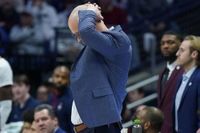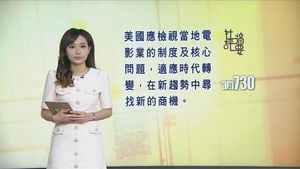The UConn Huskies' hopes for a historic third consecutive NCAA Championship title came to a heartbreaking halt on Sunday, March 23, 2025, when they lost to the Florida Gators 77-75 in the second round of the NCAA Tournament in Raleigh, North Carolina. This loss marks a significant moment in collegiate basketball, ending a remarkable 16-year streak for UConn in which they had never lost a tournament game after holding a lead at any point in the second half.
Coach Dan Hurley watched from the sidelines with a heavy heart, reflecting on a powerful performance from his team that ultimately fell short against a fierce Florida squad. "I thought we played with tremendous honor. We played with the heart of a championship program, a program that's gone back to back," Hurley stated, acknowledging the high expectations that come with UConn's recent legacy.
Throughout the season, the Huskies had enjoyed a relatively strong showing, entering the tournament with a 24-10 record, but they faced elevated challenges against Florida, boasting the second-best offense in the country. The game turned pivotal in its final moments. UConn held a slim lead of 61-59 with just over three minutes remaining when Florida's Walter Clayton Jr., who scored a game-high 23 points, converted a critical three-pointer. This shot catalyzed a shift in momentum, leading to another dunk from Will Richard that sealed UConn's fate.
This unexpected exit not only denied UConn the chance to become the first team since the UCLA Bruins of 1967-73 to achieve a three-peat but also broke a stunning record where UConn had previously won 26 consecutive NCAA tournament games whenever it held a lead after halftime. CBS analyst Matt Norlander highlighted this incredible statistic, adding weight to the loss. "UConn had won 26 consecutive NCAA tournament games when leading at any point in the second half," he remarked, capturing the gravity of their defeat.
As the Gators celebrated their victory—advancing to the Sweet 16 for the first time since 2017—the UConn team was left to contemplate not just the loss, but the narratives that have surrounded their season. Critics, including ESPN's Jeff Goodman, pointed to recruitment and coaching decisions as pivotal to the Huskies' struggle this year, particularly pointing to the situation with guard Aidan Mahaney. Once a promising transfer averaging nearly 14 points at Saint Mary's, Mahaney faltered at UConn, finishing with a mere 4 points per game in a season filled with high expectations.
Coach Hurley acknowledged the miscalculations made during the season, particularly regarding Mahaney's fit within the team's structure. "It probably would have made more sense to start him (Diarra) from the opener," Hurley said, reflecting on the adjustments made mid-season as they navigated through losses. This statement highlights how critical decisions turned out to be detrimental to UConn's quest for another title.
UConn’s loss also followed a February revelation about their chances of success heading into March Madness and their evolving roster. Having lost key players like Cam Spencer and Stephon Castle, the adjustments made to the lineup could not mask a “recipe for disappointment,” particularly when considering Hurley’s past successes with the transfer portal.
In the next rounds of the tournament, Florida will face either Colorado State or Maryland, aiming to leverage their recent performance as a springboard into deeper rounds. For UConn, the road strengthens to fortify its lineup through strategic recruitment and galvanize their spirit after what’s been a trying season. The task for Hurley now becomes clear—fill the gaps left by departing players, particularly through the transfer portal, in hopes of building a competitive team once more.
As the dust settles on this year's NCAA Tournament and the long-standing legacy of UConn’s basketball is assessed, one thing is certain: the Huskies' resilience will be tested in the seasons to come. Will they rise to the occasion and restore their former glory in next year's tournament? Only time will tell, but one thing is sure—the path forward is fraught with challenges as the spotlight remains fixed on UConn's next moves in pursuit of basketball relevancy in the ever-turbulent landscape of collegiate athletics.




